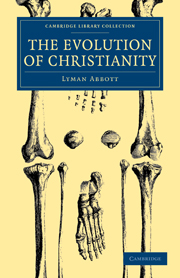Book contents
- Frontmatter
- Preface
- Contents
- CHAPTER I EVOLUTION AND RELIGION
- CHAPTER II THE EVOLUTION OF THE BIBLE
- CHAPTER III THE EVOLUTION OF THEOLOGY: THE OLD THEOLOGY
- CHAPTER IV THE EVOLUTION OF THEOLOGY: THE NEW THEOLOGY
- CHAPTER V THE EVOLUTION OF THE CHURCH
- CHAPTER VI THE EVOLUTION OF CHRISTIAN SOCIETY
- CHAPTER VII THE EVOLUTION OF THE SOUL
- CHAPTER VIII THE SECRET OF SPIRITUAL EVOLUTION
- CHAPTER IX CONCLUSION: THE CONSUMMATION OF SPIRITUAL EVOLUTION
CHAPTER IV - THE EVOLUTION OF THEOLOGY: THE NEW THEOLOGY
Published online by Cambridge University Press: 29 August 2010
- Frontmatter
- Preface
- Contents
- CHAPTER I EVOLUTION AND RELIGION
- CHAPTER II THE EVOLUTION OF THE BIBLE
- CHAPTER III THE EVOLUTION OF THEOLOGY: THE OLD THEOLOGY
- CHAPTER IV THE EVOLUTION OF THEOLOGY: THE NEW THEOLOGY
- CHAPTER V THE EVOLUTION OF THE CHURCH
- CHAPTER VI THE EVOLUTION OF CHRISTIAN SOCIETY
- CHAPTER VII THE EVOLUTION OF THE SOUL
- CHAPTER VIII THE SECRET OF SPIRITUAL EVOLUTION
- CHAPTER IX CONCLUSION: THE CONSUMMATION OF SPIRITUAL EVOLUTION
Summary
The Lutheran Reformation was a North Europe reaction against Roman imperialism, the protest of the Germanic race against ecclesiastical Caesarism; a great intellectual and spiritual awakening, due to a new interpretation of Christianity by a people whose nature and traditions were individualistic. Its birthplace was Germany; its inspiration was Teutonic.
Almost simultaneously with the protests against the papal authority and the demand for an open Bible were the discovery of a Western continent and a quickened commerce, the invention of the printing-press and a revival and enlargement of literature, the birth of the scientific spirit and its application both to theoretical science and to the practical arts. Shakespeare and Cervantes, Gutenberg and Albert Dürer, Columbus and Copernicus, Loyola and Calvin, Xavier and Luther, were almost contemporaries. The first post-office, the first printing-press, the first telescope, the first spinning-wheel, were all nearly contemporaneous with the first open Bible and the first freedom of religious speech. These are not accidents. In history there are no accidents. The predominant principle of the Reformation, — the right of private judgment, — was more than a religious principle; certainly it had much more than a theological application. It was a revolt against authority. It threw humanity back upon its own resources. Rights are duties; and the right of private judgment laid upon mankind the duty of original investigation and inquiry. This right had first to be taught to man, who is always reluctant to take up a new right if it impose a new duty.
- Type
- Chapter
- Information
- The Evolution of Christianity , pp. 96 - 135Publisher: Cambridge University PressPrint publication year: 2009First published in: 1892



